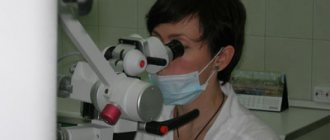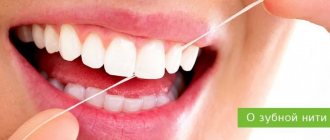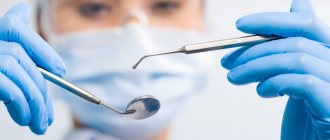How is a dentist different from a dentist?
The difference is in the level of education and credentials. According to the job description, a dentist cannot perform certain types of treatment.
In practice, patients often encounter specialists without higher education, “jacks of all trades.” This situation is common in small settlements, where a medical institution has only one staff member for the treatment of oral diseases.
Take note:
- many specialists with secondary medical education claim that they perform dental treatment no worse than dentists, supporting their arguments with reviews from satisfied patients;
- but without the necessary level of knowledge it is impossible to correctly deal with a complex case and prevent side effects;
- without constant professional development, the introduction of new technologies, and modern materials, it is impossible to offer the patient the most gentle method of treatment;
- It is no coincidence that private dental clinics regularly spend considerable sums on advanced training courses and symposiums for practicing doctors.
conclusions
There are a lot of specialists in dentistry, and the activities of each of them are different. It is important to remember that you can avoid serious oral health problems and trips to dental clinics if you follow the basic rules:
- brush your teeth twice a day;
- visit the dentist once a year, even if there is no reason for this;
- Do not delay your visit if your gums become sensitive or inflamed.
By following these conditions, you will protect yourself from problems in the future. Do not be afraid of doctors; many diseases begin completely asymptomatically, and only a specialist will be able to identify the threat in time.
Dentist
The specialist studies at a medical college for 3 years, studies the structure and features of the dental system, and learns simple dental procedures. But a doctor with a secondary medical education should not perform complex prosthetics, correct bites, or treat pulpitis.
What antibiotics can be taken for stomatitis? Watch the review with instructions for use.
Methods for treating trigeminal neuralgia at home are described on this page.
What does a dentist do:
- examines the oral cavity;
- finds out the cause of pain;
- identifies and treats gum diseases;
- fills a tooth with a small degree of tissue destruction;
- explains the rules of oral hygiene;
- gives advice on choosing toothpaste, mouthwash, dental floss, and oral irrigator;
- if periodontal disease, periodontitis, deep caries, pulpitis, curvature of tooth units destroyed by 50% or more, or other complex pathologies are detected, he is referred for consultation to a specialist.
Dentist
The specialist spent 5 years gaining knowledge at a medical institute, after 2 years he studied in residency or worked as an intern for a year. In addition to the structure of the dental system, the dentist studied physiology, anatomy, and the interaction of various organs. Biochemistry, psychology, therapy, histology, bacteriology and a dozen other subjects were on the class schedule.
After graduating from medical university, a general dentist chooses one (or several) specializations. Pediatric dentistry differs significantly from orthopedic and orthodontic treatment. A dental therapist has broader powers than a dentist, and a dental surgeon can not only administer anesthesia and remove teeth, but also perform operations on the gums and jaw bones.
Do you know who a dentist is? This is what a dentist is called in other countries. In Europe, the USA, and other Western countries, a specialist with a secondary medical education performs the same functions as a dentist in Russia.
Rubric “Question and answer”
Who is a dentist?
The concept was used in the 20th century and is now considered obsolete. Previously, the term was used to describe dentists who did not have a special higher education. In foreign countries, a dentist is a dentist who has received secondary education in his specialty. This term can be used to describe a dental laboratory specialist, a dentist, or a paramedic.
Can a dentist perform the duties of a dentist?
The answer to the question will be negative, since the dentist does not have the necessary skills and knowledge to carry out the procedures that are the responsibility of a dental therapist.
Therapist
The specialist performs the same manipulations as a dentist. In addition, a dental therapist deals with more complex problems with teeth and gums.
The doctor has a wide range of responsibilities:
- treats dental diseases: deep caries, pulpitis;
- selects and places fillings for severe tooth decay;
- carries out endodontic treatment;
- treats severe inflammation of the gums, mucous membranes, tongue;
- whitens teeth;
- carries out sanitation of the oral cavity;
- performs professional teeth cleaning with ultrasound or using Air Flow technology;
- conducts preventive examinations and gives recommendations on oral care;
- when identifying malocclusions or diseased teeth that cannot be restored, he refers the patient to specialized dentists: an orthodontist and a surgeon;
- in the absence of one or more units of the dentition, the dentist-therapist recommends a consultation with an orthopedic dentist, or “in popular parlance” – a prosthetist.
Principles of remuneration in public and private clinics
The difference between private and public dentistry in remuneration can be quite significant. For example, in the capital, a dental therapist in a public clinic receives 50-60 thousand rubles , but in a private clinic, all other things being equal, he will receive 80-120 thousand rubles. In public medical institutions, a dentist’s salary consists of the official salary and various allowances. Among other things, such specialists receive additional payments for qualification categories, for a scientific degree (if any), etc.
In private clinics, salaries are calculated differently. At the same time, such institutions often compete with each other for good specialists, so everyone pays high salaries, and additionally attracts staff with good working conditions - a social package, modern equipment and optics, the presence of assistants, etc.
As a rule, if a dentist does not open his own office, but goes to work as an employee, then a plan for services is set for him, or more precisely, for their total amount. Depending on this, he receives the initially established percentage. At the same time, good clinics set a very realistic plan, taking into account the experience of previous months, and it is not difficult to implement it.
Salary for percentage
Pricing is usually determined by the clinic’s management. But in general, the price of relatively simple manipulations is determined by the cost of the materials used, to which a certain markup is added. However, in some areas of dentistry, the so-called technical cost of work is used - this is, for example, relevant for crowns and veneers, which are made not by the dentist himself, but by a dental technician. In this case, the percentage for calculating the salary of the dentist-therapist will be calculated a little differently. The markup itself can be almost any amount. In private clinics, it includes both payment of taxes and salaries of all staff, so it can be 200% or more.
Gray additional methods earnings
It also happens, of course, that not very conscientious doctors impose additional services where they could have done without it (mostly this concerns some aesthetic problems or professional oral hygiene services, but in general in reputable clinics this rarely happens).
Bonuses and awards
Most private clinics do not offer additional bonuses or bonuses. But some institutions practice training employees in courses and seminars at their own expense, and there are also those that include meals for employees in their benefits package.
Penalties
But there is a system of fines. Basically, they fine small sums for various violations of labor discipline - for example, for being late or for untimely filling out medical documentation. If the doctor makes any mistakes in treatment, then more stringent measures can be taken.
When working in a private clinic, you need to keep in mind that although the registration will be official everywhere, the management still wants to save on taxes. Therefore, many register as part-time doctors in order to minimize their contributions to the tax and pension fund.
Other professions: What are the salaries of social workers in Russia?
Surgeon
The specialist deals with the following issues:
- removes diseased teeth if the therapist has given a conclusion that restoration is impossible;
- carries out extraction (removal) of healthy teeth that interfere with the normal growth of neighboring units;
- performs correction of dental anomalies, removal of impacted (unerupted) wisdom teeth, supernumerary units;
- the help of a dental surgeon will be needed if certain units grow incorrectly, for example, in 2 rows;
- The specialist's competence includes implantation and various types of prosthetics.
Related materials:
dentist | Givenchy | SEPHORA COLLECTION | Dior | Givenchy | Sephora | Dior | teeth | white teeth | smile | beautiful smile | prosthesis | surgery
Articles
- In the know: fall makeup trends August 29, 2015, 00:00
- Virtual Stylist: The Most Stylish Apps December 17, 2021, 00:00
- Pastel makeup: making accents January 25, 2021, 00:00
Video
- New birth of four-color shadows from Givenchy September 15, 2010, 00:00
- Little tricks for a dazzling smile from Givenchy October 20, 2010, 00:00
- Beauty in Korean October 24, 2021, 12:00
Orthopedist
Patients who have lost one or more units of dentition turn to this specialist. The doctor will help people who have ugly stumps sticking out instead of teeth, causing injuries to the mucous membrane.
What does an orthopedic dentist do:
- performs full or partial prosthetics;
- restores the beauty of a smile;
- selects the optimal method for normalizing chewing function.
Important! Before consultation with a prosthetist, it is mandatory to sanitize the oral cavity and eliminate inflammatory processes of various etiologies. A visit to the dentist or dental therapist is the first stage of orthopedic treatment.
Reviews
- No. 1. Becoming a dentist requires a certain amount of persistence and determination. It took me a total of about 8 years to study, and I didn’t even count how many times I attended various seminars and conferences after receiving my diploma (well, there were already courses twice). I didn’t immediately understand what direction I wanted to work in, and only after the internship I came to the conclusion that I would be a pediatric dentist. Working with such patients is not easy, but there are more positive emotions. After the appointment, I always give my patients some kind of souvenir - soap bubbles or balls with the symbols of our clinic, and on my own behalf - certificates for bravery, I simply print them out on a printer. I work in a private clinic, the salary is 80-90 thousand rubles per month. Our team is good, overall I’m happy with everything.
- No. 2. I myself work as a dental surgeon, and my wife is a dental therapist. When we had the opportunity, we opened our own office. It wasn’t easy, and it wasn’t even a matter of finding clients; we literally lured many away when we left our previous place of work. It’s just that organizing an office is an expensive pleasure, considering all the standards. We try not to raise the markup too much in order to retain customers - the competition is still quite strong, and we set aside part of the money for upgrading equipment, so my monthly salary is 77-80 thousand rubles, my wife gets about the same (75 on average ).
Orthodontist
Most people encounter a specialist in this category during their lifetime. Bite anomalies, according to statistics, are observed in 80% of residents of different countries. Some studies suggest a higher percentage of patients who are candidates for orthodontic treatment.
The main task of an orthodontist is to restore the beauty of a smile. According to scientists, bite defects not only worsen aesthetics, but also provoke serious pathologies of the gastrointestinal tract, cause headaches, and severe diseases of the gum and bone tissue.
What does an orthodontist do:
- aligns the dentition;
- eliminates wide interdental spaces, removes diastema - the gap between the “units” in the center of the dentition;;
- corrects the growth of milk and permanent units;
- gives recommendations for the prevention of malocclusions;
- controls the formation of the jaw in childhood.
Take note:
- the specialist draws up a treatment plan, takes impressions, sends the jaws for x-rays, sends the collected materials to the dental laboratory;
- after receiving the finished product, the doctor installs the design, gives recommendations for care and correct correction;
- During the entire period of treatment, the patient is observed by a doctor who installed braces, retainers or other special devices;
- The duration of correction is calculated in months, often years (especially in adults).
Removable and non-removable orthodontic structures help correct bite defects:
- stretching plates;
- bracket systems;
- veneers;
- lumineers;
- orthodontic devices;
- lip bumpers;
- retainers;
- trainers;
- aligners;
- orthodontic aligners;
- clasp devices.
What do you need to know about working in a private clinic and your own office?
Despite the fact that such work brings more income, it is associated with certain nuances that you need to be aware of when choosing a certain type of activity. For example, in a private clinic, doctors must first familiarize themselves with corporate standards; some even introduce a dress code. And when opening your own office, you need to spend a lot of money and time to bring everything into compliance with the standards prescribed in laws and regulations.
Dentist advertising and job search
For a dentist, reputation is very important when looking for a job. Therefore, he can gain experience in a state clinic, so that he will soon be able to receive good recommendations. In addition, there are special professional groups on social networks where dentists can post photographs of their most successful work. This can be considered a kind of self-promotion, so that in the future you can refer to this portfolio during an interview. Of course, photographs need to be protected with watermarks, since such works can simply be stolen.
Working with social media networks
Owners of private accounts can actively promote their services on social networks, but in groups aimed at consumers. For example, you can use Instagram as a tool by tagging relevant hashtags. This technique is considered especially effective for orthodontists who primarily offer aesthetic medicine services.
Work schedule in a private clinic or your own office
Many people believe that private clinics have more flexible hours than public clinics. Actually this is not true. Very often it is scheduled several days in advance and without any “windows”. In addition, many clinics are open six to seven days a week to accommodate those patients who cannot make an appointment on weekdays. But private clinics are good because they have more time to see patients, the doctor can plan a lot himself, and as a result he works at a more comfortable pace.










